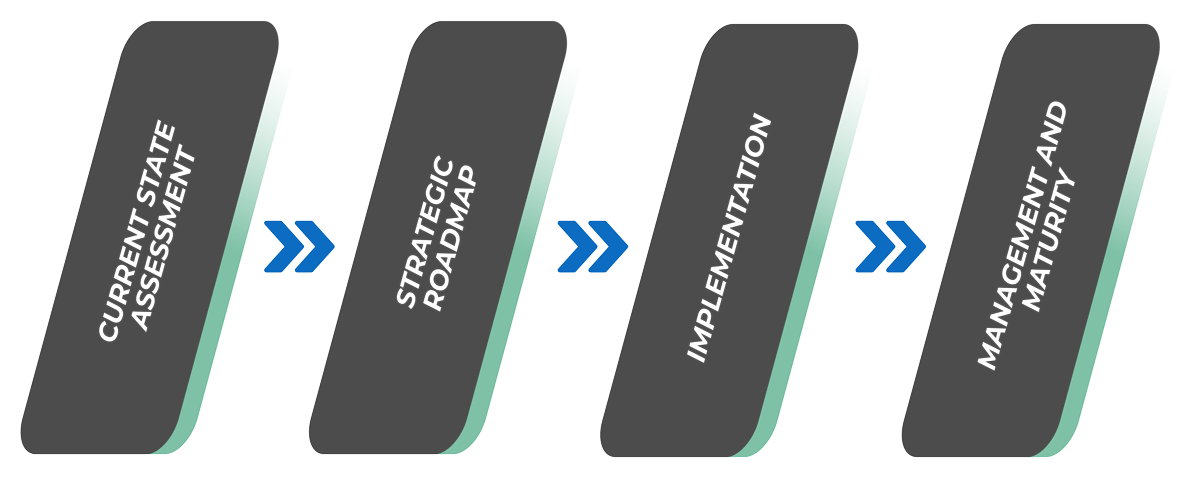Tynebridge Digital Partners is your Digital Trust leadership and support team providing a unified client experience which combines all four digital trust domains: data governance & management, data privacy, security, and IT. This simple and sustainable digital trust program is informed by your overall business strategy, and is communicated to your customers, employees, and stakeholders.
Your Digital Trust Partner.
Digital Trust Maturity Journey & Methodology
Digital trust is built incrementally in stages. Tynebridge Digital partners coordinate and oversee effective execution of digital trust plans for your organization.

INITIAL CURRENT STATE DIGITAL TRUST ASSESSMENT
Step one of the Digital Trust journey is to perform a current state Digital Trust maturity assessment. Beginning with a set of information gathering sessions, the initial current state assessment:
- Defines what digital trust means to your organization
- Shows the current state and helps you understand where you are
- Identifies your Digital Trust gaps
- Helps you set your priorities
- Informs your digital trust strategy for maturity and optimization
- Establishes your starting point
PRIORITIZED DIGITAL TRUST ROADMAP
This stage involves the creation of your Digital Trust Maturity Roadmap informed by the recommendations from the assessment in Stage 1.
The action items are mapped out in a timeline, beginning with the ‘Quick Wins’: high value/low investment improvements.
This roadmap document outlines a customized, strategic approach to digital trust for creating and implementing policies, procedures, and making decisions.
IMPLEMENTATION OF BEST PRACTICES
Now that you know where you are and where you are going, it’s time for the implementation of the digital trust maturity recommendations. Having high quality data that supports your business and serves your customers and stakeholders requires operationalizing best practices. This stage involves actioning the items on the Digital Trust Roadmap with guidance on next steps.
MATURITY IMPROVEMENTS & MEASURING PROGRESS OVER TIME
There is almost always room for improvement. Once digital trust is established, it needs to be continuous and consistent.
This stage involves executing processes, making measurable digital trust progress, and moving up the maturity scale.
Take the first step towards digital peace of mind.
Safeguard your online presence with our trusted digital trust service today. Protect what matters most – your digital life.
Member Contributor of SafeHouse Initiative

The SafeHouse Initiative is a nonprofit organization dedicated to promoting cybersecurity awareness and education, especially among Small & Medium sized Businesses (SMBs). The SafeHouse Initiative provides a wealth of resources and guidance to help businesses strengthen their cybersecurity posture.
Member Contributor of SafeHouse Initiative

The SafeHouse Initiative is a nonprofit organization dedicated to promoting cybersecurity awareness and education, especially among Small & Medium sized Businesses (SMBs). The SafeHouse Initiative provides a wealth of resources and guidance to help businesses strengthen their cybersecurity posture.
Digital Trust is Good for Business
When individuals and organizations entrust (lend) their personal and corporate digital information to other organizations, it involves trust. Because customers own their data and it represents sensitive details about their lives, they expect their information to be protected and their privacy respected. This relationship requires a high level of trustworthy data stewardship. Consumer data is incredibly valuable and needs to be managed like a precious asset and protected as diligently as a cash box.
Digital trust needs to be established, demonstrated, and preserved between:
- Service providers and their clients
- Product suppliers and their clients
- Corporations and their shareholders
- Organizations and their employees
Digital trust is a cornerstone of an organization’s reputation. Since businesses depend on digital data and business relationships are built on trust, ‘Digital Trust’ is, therefore, essential for business. Digital Trust is a common thread shared by the public sector, private sector, and not-for profit sector alike. These organizations have the non-transferrable responsibility to safeguard the sensitive information of individuals who place their trust in them.
Digital Trust:
- Is Informed by the overall business strategy
- Drives decisions about privacy, security, data, governance, and information technology
- Is communicated to customers, clients, employees, and key stakeholders of the organization
As your digital trustworthiness increases, your efforts can then be powerfully articulated to your clients and stakeholders as part of a Digital Trust communications strategy.
Trust lies at the heart of all relationships, whether business or personal. Relationships and reputations are built by establishing trust on the front end and maintaining it over time. It is far easier to build trust than to repair trust when it is broken or damaged. Trust is also central to business relationships. Organizations spend great amounts of time, energy, and money to build up goodwill with their customers and stakeholders. Trust is the foundation of business, and the core of trust delivery is empathy toward the customer.
Digital trust is crucial for ensuring security, protecting privacy, enabling transactions, fostering collaboration, building reputations, and driving innovation. It forms the foundation for a thriving digital ecosystem and empowers individuals and organizations to engage confidently in the digital world.
In the pre-internet era, businesses primarily earned customer trust in person and over a long period of time. In today’s digital world of one-click transactions, trust is a dynamic pursuit which requires agility since trust often needs to be established instantly. Considering that the majority of modern communication is virtual, the majority of trust needs to be established digitally. Companies must now show customers they value and respect their digital presence as much as their physical ones.
Why does Digital Trust Matter? Every business is a digital business, and trust is currency in business. Digital trust is critical for consumer/ business relationships because any misuse (including loss) of private information is considered a breach of that trust. If you are in business, to one degree or another, you are in the relationship business. If your business relationships and your reputation are not intact, it significantly weakens your position in the marketplace.
Digital trust preserves business relationships with clients and stakeholders, which underpins your business growth and sustainability. The ability to demonstrate digital trust to your present and future clients is a competitive differentiator to help you win and keep business.
What does succeeding in Digital Trust mean for your organization?
- Risk Reduction (privacy violations, security breaches, data mismanagement)
- Competitive differentiation to acquire new clients and increase your revenue
- Retention of your current clients
- Increased efficiencies because your data is more structured, usable, and optimized
Digital trust is good for business and the importance of trust is unlikely to diminish. There is a direct correlation between customer experience, and competitive advantage and revenue. An investment in digital trust is an investment in the success of your business.
When data is combined with technology, it creates risks, especially when collecting customer information. Unauthorized access to, or misuse of their data in your care, can create barriers to trust for your customers. By mishandling their sensitive information, you can violate or completely break their trust in you, undermining or destroying your relationship with them moving forward. When client trust is shaken because of a company’s actions, clients will often vote with their feet. The result is often reputational damage and revenue loss. When donor trust is broken by the actions of a charity, or constituents lose trust in their local government, the results are similar.
Although they might not articulate it to you explicitly, your clients and stakeholders have underlying expectations of your organization to protect them from harm when they trust you with their data. While it is best to proactively identify and remediate your data issues, even inconsistent application of digital trust leaves gaps that put people and business relationships at risk. The costs of neglecting digital trust can be substantial. To not establish, build, and maintain digital trust with clients, employees, partners, and shareholders is to make a dangerous assumption that consumer trust cannot be shaken by an unexpected event. As data multiplies and data-dependence in the business world increases, the absence of digital trust will increasingly become an obstacle to achieving the strategic business mission. Lose Digital trust and lose a foundational component of your competitive advantage.
Digital Trust also involves extracting value from high quality data that supports your business and serves your customers and stakeholders. Your digital trust efforts should solve operational problems, serve your strategic priorities, and enable organizational success by improving business processes to support the business strategy.
By definition, data is information belonging to, and about people and organizations. Most data today is stored and sent electronically; it is digital. Digital data is usually in the form of text, audio, or video files, often communicated on the internet, and stored electronically, as opposed to printed paper in physical folders and filing cabinets.
Data has a lifecycle which needs to be properly managed. Data is dynamic – It is collected, created, stored, arranged, used in multiple places, and ultimately removed. Chances are that in the regular course of your operations, your organization collects digital data that is unstructured and not being used for business activities such as analyzing it for market insights or making strategic decisions. Likely, there is some valuable and sensitive information belonging to your clients, employees, and stakeholders among this ‘dark data.’ This data can be a ‘toxic asset’ which needs to be securely removed when its liability increases and is no longer valuable to your organization. Not all data is created equal.
Data is central to business. As the volume and the velocity of data increase, the world is becoming more data dependent. Since business depends on having the ability to share information, organizations of all shapes and sizes run on data. In fact, in order to continue operations and provide your products and services to clients, your business needs data. Your data can be an asset or a liability, depending on how you manage it. If you manage it as an asset, you can create value for your clients and stakeholders. As an asset, your data can provide you with a competitive advantage, especially if you can demonstrate its quality and security.
Digital trust is essential to organizations that rely on data to operate. Organizations are also responsible for the data they handle. They need to steward data by respecting and protecting individuals and the data they own. Understand your information landscape by answering these questions:
- What data to you have in your organization?
- What is your most valuable data?
- What is your most sensitive data?
- In what ways does your organization depend on data?
- What value do you place on your information?
- How long could your business survive without access to your information?
- Where is this data?
- Who has access to it (and why)?
- What is this data being used for?
- How do your clients and customers expect you to look after their sensitive data?
- How well protected is your sensitive data and the information systems where your data is sent and stored?
A central goal of digital trust is to have high quality data that supports your business and serves your customers and stakeholders. Delivering trust-inspiring customer experiences requires a culture of ‘Digital Trust by Default’ and continuous improvement. As your organization moves up the maturity curve of ‘digital trustworthiness,’ you will go from operating in an ad hoc fashion, to optimizing your data.
A digitally trustworthy organization:
- Governs their data
- Secures their data and infrastructure
- Uses their data responsibly
- Respects their clients’ privacy
- Communicates effectively with customers, clients, investors, members, and employees
Transparency creates trust with consumers. Effective communication of your Digital Trust efforts to your clients and stakeholders allows you to create a transparent agreement with them. This is the evolution of Digital Trust, and it communicates:
- That you are accountable, humble, and grateful for their trust in you
- How well you are governing, managing, and using their data
- Your level of Digital Trust maturity
- Assurance that if anything bad happens, you will let them know
Reliable data stewards protect the interests of data owners and demonstrate that they do this well. Mistakes happen, but if you can demonstrate that you’re holding your leaders and yourselves to a higher standard, you will remain in good standing with your customers and stakeholders. Companies that can do this through strong and demonstrable cybersecurity and privacy practices will realize the benefits that trusted relationships bring such as efficiency, flexibility, and loyalty.
Tynebridge Digital Trust Partners are the bridge for you:
- On the journey from your current state to your desired state of digital trust maturity
- In your communications with your clients and stakeholders, helping you establish (or re-establish) trust
- To address the data governance, privacy, security, and technology gaps identified in the initial assessment phase
- To build the infrastructure which allows data to flow
- To translate the languages of business, risk, technology, and trust in your organization
- To bring data privacy, data security, data governance, IT, and the business together, no longer having to operate in silos
- To efficiently and cost-effectively access the data governance, privacy, security, and technology resources you need
Digital trust is a business driver which builds client and stakeholder confidence. It is much less of a burden to the organization to do it right the first time than to try to bolt it on retroactively. Consider the cost to acquire a new customer versus retaining your existing ones. The cost of getting digital trust right in the first place is much less than the cost of getting it wrong and having to fix it.
To become a digitally trustworthy organization, you need to create the conditions that allow for digital trust to flourish. This is accomplished by embedding digital trust into your company DNA in your planning, your processes, and your people. You need a strategy with a starting point to both prevent wrong things from happening with your data, and to make sure that the right things are being done with your data. Digital trust applied consistently across the organization will eliminate silos, reduce costs and complexity, and improve communication and cooperation.
Proactively supporting optimal, responsible use of data and preventing miss use of data is much better than trying to implement these practices during a data breach or significant cyber-attack.
